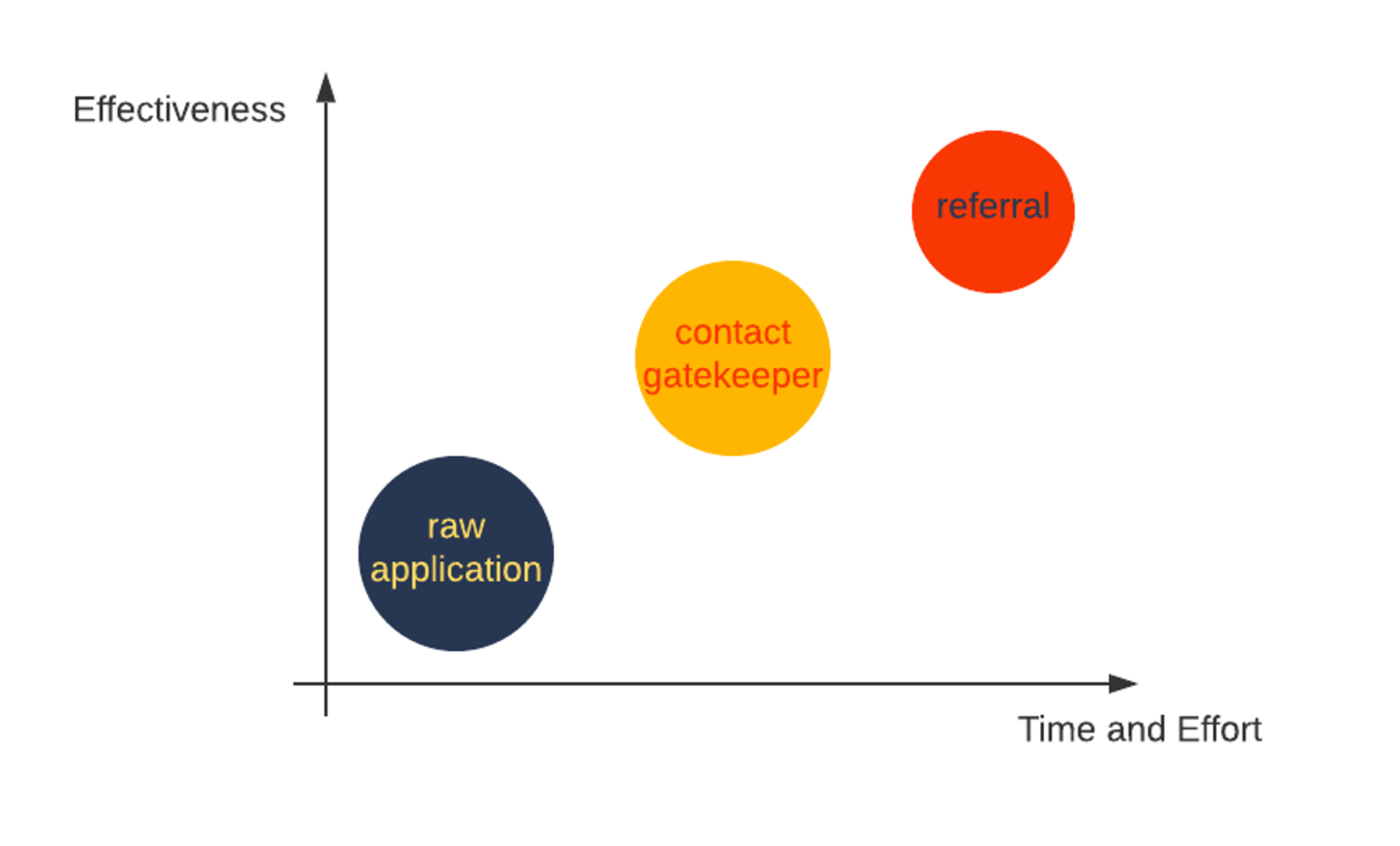Why Aren’t You Getting Data Science Interviews?
Feb 24, 2023
Before you can ace interviews, you have to get interviews, but how exactly do you do that?
If you are just getting started with your job search, I recommend starting with my post on choosing the right data science position first. If you already know the position, this post will guide you through the process of turning applications into interviews.
We will look at three different ways to get interviews and how to troubleshoot if you have been looking for a while and haven’t landed an interview.
(You can also get this information from my Youtube channel if you prefer videos to blogs.)
Let’s get started!
Different Methods for Getting Interviews
There are three basic ways to get interviews:
- Raw Applications
- Reaching Out to Gatekeepers
- Getting Referrals
This diagram compares the effort and effectiveness of the different methods.

Raw Applications
A raw application is just submitting your resume to an opening. People usually do this through job boards like LinkedIn, but it is worth going directly to the company’s website instead. The website will have more accurate and up-to-date postings.
The biggest thing that you can do to increase the effectiveness of your raw applications is to do some personalization. I know it’s tempting to send out the same resume to hundreds of jobs, but the extra effort can really pay off.
Do some research, and adjust your resume to fit the position. Effort like this shows a high level of interest in the job and greatly increases your chances of getting a response. Everyone is sending out cookie-cutter applications, so personalizing yours will make it stand out.
Raw applications are the most common way to get interviews, but it isn’t the only (or most effective way). Let’s look at some other methods you can pair with this to increase your chances of getting that interview.
Reaching Out to Gatekeepers
Gatekeepers are technical recruiters or an employee at the company at which you want to work. Reaching out to them involves four basic steps:
- Make a list of companies you want to work for.
- Find the contact information for the gatekeepers at those companies.
- Write an email pitch or a LinkedIn message.
- Follow up until you get rejections.
If you want to know more beyond those basic steps, check out this other post where I dive into the details (including email templates!).
Referrals
Referrals are the most effective way to get interviews, but that does not mean you should just start asking everyone for them. Referrals should come from people who know you and are familiar with your work.
This is why networking is an important skill. If you want a referral from someone who doesn’t know you very well, put in some effort. Take them to coffee and get to know them. There needs to be a relationship there before you ask for a referral.
Once you have a person willing to refer you though, then what do you do?
The goal should be to make the referral process as easy as possible for the person referring you. Find the position you want to apply for and send the person the information.
At this point, you might be unsure if you should apply through the normal job board or what. In most companies, the referrer will use an internal job board to submit the referral. You provide your resume and the job post, and the referrer does the rest.
At this point, in most cases, you should not apply for the job normally because this will make the referral ineffective. There are some companies though that will want you to apply normally too, so the best thing is to clarify instructions with the referrer.
Now, what if the company the referrer works for has many openings? Can you use the referral for multiple positions at once?
Honestly, it depends. Some companies let you apply for multiple positions at once and others don’t, so again, you will need to clarify with whoever has agreed to refer you. If you can apply to multiple positions, it’s usually worth doing.
Remember that while referrals are great, you should be using a combination of all 3 methods to have the best chance of getting interviews.
The Importance of a Good Resume
Now that you know the three methods of getting interviews, I want to talk about another important aspect of getting to the interview stage: your resume.
Regardless of the method, you’re going to need a good resume to make it to the interview. That’s why it’s worth double-checking your resume. Ask yourself if your resume showcases the skills needed for the position. If not, some finetuning would be helpful.
If you are not sure how to do that, check out my free resume checklist.
What If I’m Not Getting Interviews?
Alright, so what if you’ve done all that and you still aren’t getting interviews?
Job searching is difficult, and if you have not got interviews that can be very discouraging. However, it’s important to keep the momentum going!
Getting interviews takes time and a lot of applications. If you slow down it’s only going to take longer, so keep going!
I am not saying this to minimize the frustration of not getting interviews, but it’s crucial to know that it often takes longer to get results than you may realize. Don’t expect to hear back immediately, and while you are waiting, keep applying.
Diagnosing Your Problem
Now if you have given it time, it may be time to start considering what the problem is.
The first potential problem is the number of applications. How long you have been looking may not be as important as how many applications you have sent out. I would say that if you’ve applied to less than 500 jobs, reached out to less than 10 gatekeepers, and asked for less than 10 referrals, the first thing to do is simply send more.
If you have sent out more than that, waited for 2 to 3 months, and gotten less than 5 interviews, it may be wise to reconsider your target position. Such a low application to interview conversion is likely an indication that your background is not suited for the positions.
One way to fix this would be to switch target positions. If you don’t want to do that, I recommend focusing on jobs at smaller companies and startups, where there will be less competition. It can be hard to give up on what you want, but sometimes you may need to adjust where you are looking because of your qualifications and job demand.
The Hiring Season
I want to talk about one final thing in this post: the hiring season.
Many people worry that if they do not apply during a company’s hiring season, they will not be able to get a job.
There are two facts that you need to acknowledge about the hiring season. One, you don’t have any control over it, and two, many companies hire year-round. Job searching is stressful enough without stressing about things you can’t change, and there’s a pretty good chance that there will be positions available.
That being said, the hiring season is not a myth. It happens when companies get new budgets for headcount, which is commonly at the beginning of the year (January, February, March).
So, the beginning of the year can be a good time to look for jobs, especially for students and new grads when internships and graduate programs open. However, that does not mean that you don’t stand a chance if you’re applying later. You don’t have to hit the hiring season to get a job.
Final Thoughts
Those are my tips for anyone struggling with getting interviews. Remember most of all to keep your momentum going and put in the effort with things like referrals!
If you want even more advice on the subject, I suggest reading the longer version of this post.

